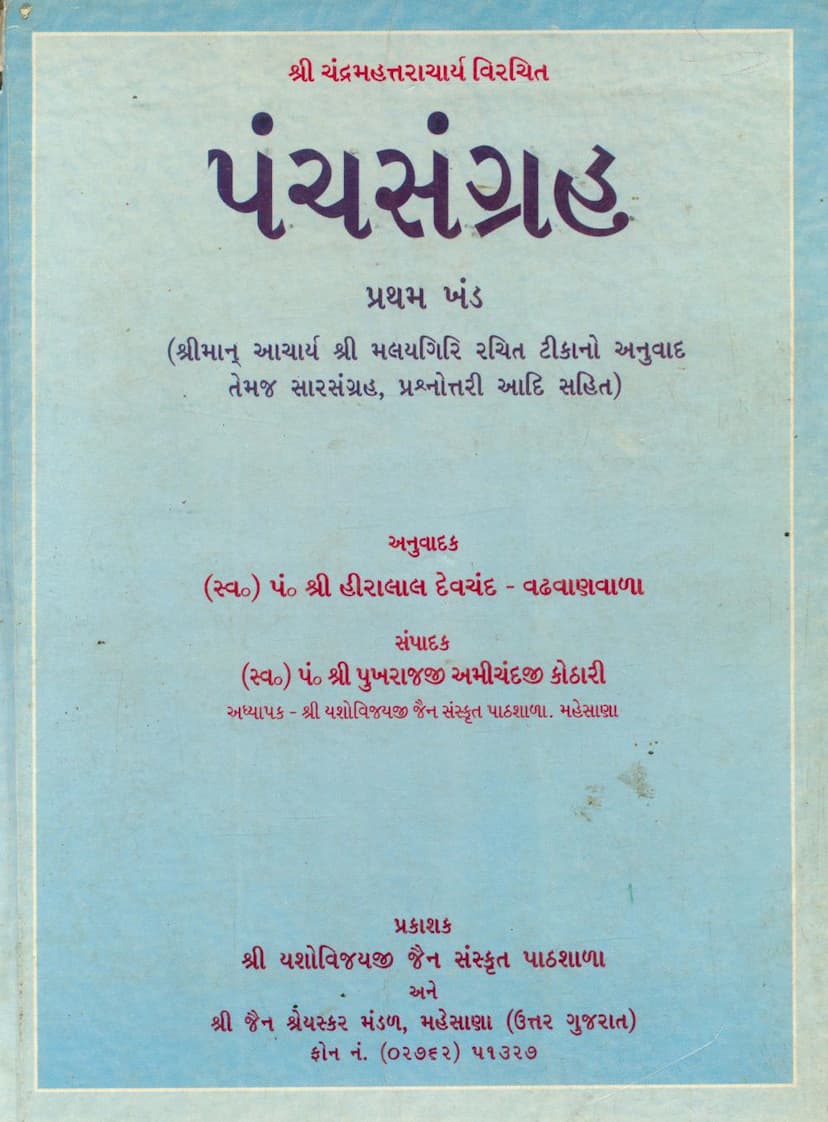Panchsangraha Part 01
Added to library: September 2, 2025

Summary
Panchsangraha Part 01: A Comprehensive Summary
This document provides a detailed summary and explanation of the first part of the Jain text "Panchsangraha," authored by Chandrarshi Mahattaracharya and commented upon by Acharya Malayagiri. The work, translated into Gujarati by Pt. Hiralal Devchand and edited by Pt. Pukhraj Amichand Kothari, is a foundational text in Jain Karma theory, aiming to make complex concepts accessible to a wider audience.
Core Focus: Karma Siddhanta
The "Panchsangraha" delves deeply into the Jain doctrine of Karma, explaining its intricacies in a systematic and accessible manner. The text emphasizes that Jainism, while deeply rooted in Karma Siddhanta, also gives significant importance to concepts like time, nature, destiny, and individual effort (purusharth).
Structure and Content of Part 01:
Part 01 of the "Panchsangraha" is structured into five "Dwaras" (sections), each exploring a different facet of Karma and its related principles:
-
Yoga and Upayoga Margana (Investigation of Conduct and Consciousness): This section meticulously details the 15 types of Yoga (physical, verbal, and mental manifestations of spiritual energy) and the 12 types of Upayoga (modes of consciousness). It then investigates how these manifest across the 14 life-forms (Jeev-sthanas) and 14 stages of spiritual development (Guna-sthanas), along with the 14 "Marganas" (paths of investigation).
-
Bandhaka (The Bondage-maker): This section focuses on the concept of "Bandhaka" – the entities that cause the bondage of karmic particles to the soul. It elaborates on the various types of souls and their characteristics, particularly in relation to the stages of spiritual development.
-
Bandhyavya (The Bondable – Karmic Matter): This is the most extensive section, detailing the eight primary types of Karmas (Jnanavaraniya, Darshanavaraniya, Vedaniya, Mohaniya, Ayushya, Nam, Gotra, and Antaraya). It further breaks down these primary Karmas into their numerous sub-categories (Uttar Prakriti), explaining their nature, function, and the subtle distinctions between them. It also covers concepts like the transformation of karmic matter (Karana), the qualities of bondage (Bandha), and the flow of karmic particles (Paryavartana).
-
Bandhahetu (Causes of Bondage): This section elucidates the causes that lead to the influx and bondage of karmic matter to the soul. It categorizes these causes into five main types: Mithyatva (false belief), Avirati (lack of control over senses and passions), Kashaya (passions like anger, pride, deceit, and greed), and Yoga (mind, speech, and body activities). It further details the sub-categories within each of these primary causes.
-
Bandhavidhi (Method of Bondage): This section explains the intricate processes by which karmic particles attach to the soul, the conditions under which they transform, the stages of their maturation, and how they are ultimately shed. It details concepts like the different types of bondage (Prakriti Bandha, Sthiti Bandha, Ras Bandha, Pradesha Bandha), their transformations (Udaya, Udīrana, Utkirtana, etc.), and their eventual effects.
Key Concepts and Contributions:
- Accessibility: The text aims to simplify complex philosophical and scientific concepts within Jainism, making them understandable to laypeople.
- Comprehensive Analysis: "Panchsangraha" provides a thorough and systematic analysis of karmic matter, its influx, bondage, transformation, and shedding.
- Detailed Classification: The text offers meticulous classifications of karmic particles and their sub-types, providing a deep understanding of the subject matter.
- Practical Application: The teachings are presented with the ultimate goal of aiding spiritual progress and liberation (Moksha) by understanding and overcoming karmic hindrances.
- Commentary and Aids: The inclusion of Malayagiri's commentary, along with summaries (Sarsangraha) and question-answer sections (Prashnottari), significantly aids in the comprehension and study of the text.
Overall Significance:
The "Panchsangraha Part 01" stands as a vital resource for anyone seeking to understand the profound and intricate philosophy of Jain Karma Siddhanta. It provides a comprehensive framework for studying the soul's journey through the cycle of birth and death, driven by the accumulation and shedding of karmic matter, and offers guidance on the path towards spiritual liberation. The translation into Gujarati and the inclusion of study aids make this text particularly valuable for Gujarati-speaking students of Jainism.